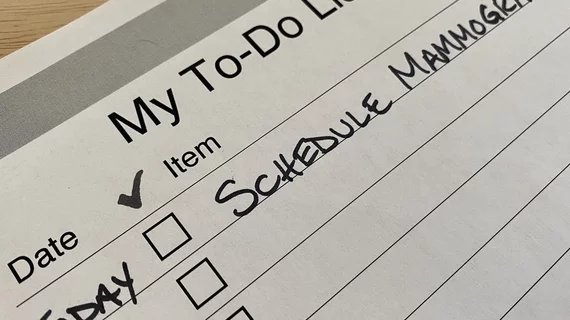Offering evening, weekend hours could increase compliance with breast cancer screening recommendations
Offering evening and weekend appointments has the potential to improve compliance with recommendations among women eligible for breast cancer screening exams.
This is especially true among women under 50 and who live in areas considered more socioeconomically disadvantaged, according to new data published in the Journal of the American College of Radiology. [1]
Acknowledging that scheduling factors are a known barrier to breast cancer screening, the new study details the impact of one institution’s efforts to provide extended hours for screening appointments. It also describes trends pertaining to the demographics of patients who took advantage of the offering the most, highlighting the benefits of expanded access across multiple groups.
The study included data from over 203,000 mammograms from 67,323 patients who completed their screening between January 1, 2015, and December 31, 2022, at one of the institution’s four sites. During that time, less than 9% of all screening mammograms took place during evening or weekend hours.
However, an upward trend was observed in 2020 after restrictions related to COVID-19 went into effect. That trend continued through 2022 after some of the most stringent precautions had long been lifted.
“When resuming screening mammography following a temporary cessation of screening due to the COVID-19 pandemic, our institution increased the availability of evening/weekend appointments at our outpatient sites. As a result, the annual percentages of screening mammograms performed on evenings and weekends increased in our population from 2020 to 2022,” corresponding author Joanna Rossi, MD, from the department of radiology at Johns Hopkins University School of Medicine, and colleagues explained.
Between 2015 and 2019, less than 6% of screening appointments were completed during evening and weekend hours. In 2020, that figure grew to 9.4%; it rose again in 2021, to 14.6% and once more in 2022, to 15.4%, as more evening and weekend appointments were made available.
The researchers found those who most often took advantage of the expanded hours were women younger than 50, a race other than non-Hispanic white, non-English speaking and from less advantaged ZIP codes.
These demographic details are important to take note of, the authors suggested, since new breast cancer screening guidelines now recommend women at average risk begin screening at age 40. This will inevitably increase demand, the authors noted.
“Our study suggests that weekend and evening appointments may make screening mammography more accessible for some of these women,” the authors suggested. “While breast cancer incidence increases with patient age, younger patients diagnosed with breast cancer are more likely to have aggressive subtypes, which underscores the importance of screening mammography for these patients.”
The authors added that extending hours would likely increase screening recommendation compliance among every demographic group.

